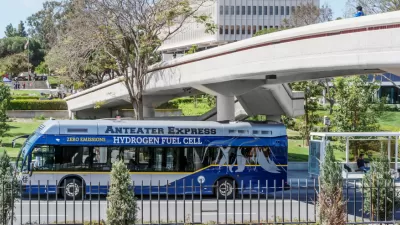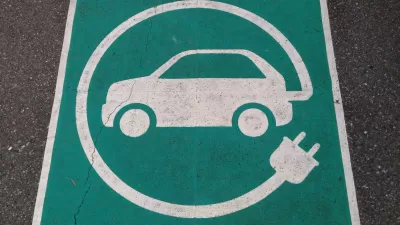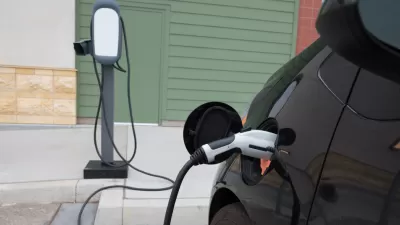California legislators hoping to entice motorists to purchase electric vehicles with more generous rebates or other perks are missing the real obstacle for many consumers, according to a new study on electric vehicle charging.
"In the past, the price of electric cars was an impediment to their adoption," writes Emily Guerin, environment reporter at KPCC, a Southern California NPR affiliate. [Listen here.].
But cost is no longer as daunting as electric car batteries have gotten cheaper, subsidies have increased, and dealerships have begun offering affordable leases.
In addition, relatively affordable, long-range electric vehicles (EVs) such as the new Chevy Bolt and the Tesla Model 3 are now, or will soon be, respectively, available for lease or sale.
A report released last month, "Plugging Away: How to Boost Electric Vehicle Charging Infrastructure," by Ethan Elkind from the University of California's Emmett Institute on Climate Change & the Environment makes the case that "a significant boost to EV charging infrastructure, particularly in workplaces, multi-unit dwellings, and fast charge 'plazas'" is necessary if the Golden State is going to reach Gov. Jerry Brown's goal of getting 1.5 million EVs on the roads by 2025.
According to the report's introduction:
This need is particularly acute for residents who do not live in single-family detached homes, where more than 80 percent of current electric vehicle owners reside. Overall, approximately 40 percent of Californians live in multi-unit dwellings (with even higher percentages in the state’s urban areas), such as apartments, townhouses, and condominiums, with impeded or no access to charging.
Ultimately, some analysts estimate that the state will need private and public sources to provide 125,000 to 220,000 publicly accessible charging ports by 2020, well beyond the roughly 12,000 available in the state today. Additionally, hundreds of thousands of other charging stations will be necessary at multi-unit dwellings.
Legislation
Tenants do have the right by law to have the property owner install chargers at their home or business (some exceptions apply) if they are willing to foot the bill. AB 2565 by Assemblymember Al Muratsuchi (D-Torrance) was one of six bills that Gov. Brown signed in September 2014 to strengthen the EV market, and that was after he signed six bills in 2013 to boost EV sales.
Charger costs
Guerin writes that chargers can cost "$2,200, according to the Idaho National Laboratory." However, the report lists the costs for Level 2 charging, which require infrastructure improvements, as considerably higher. However, these may be commercial, not residential costs.
For example, a recent California Energy Commission charging program found that a dual standard fast charger, coupled with a single “Level 2” (240 volt) charger and additional stub, averaged $135,000 in equipment costs.
Even the total costs of installing “make-ready” infrastructure, which covers all the electrical wiring needed to support a customer-purchased charger, for Level 2 charging (including customer rebates on the charging stations) were at $13,734 per port and $219,424 per site with 16 ports on average, as Southern California Edison recently found.
Types of Chargers (from the report's glossary of terms and page 9):
- Level 1 charging: uses a 120-volt alternating current (AC) plug that is found in most standard household outlets. [No additional infrastructure required]
- Level 2 charging: uses a 240-volt AC plug that requires installation of additional charging equipment. It can "fully recharge a battery overnight at as little as 1/3 the charging time as Level 1. Many homes and businesses may require new wiring to enable Level 2 charging."
- DC fast charging: uses a 480-volt direct current (DC) plug that enables rapid charging along heavy traffic routes. It can charge "a typical battery to 80 percent capacity in 30 minutes or less."
"Another issue is the cost of electricity," adds Guerin.
Public chargers, like those at malls or near highways, and those at workplaces are subject to commercial electricity rates, which are higher than residential rates. At times, it can cost so much to charge an electric car that it makes more sense to drive a gasoline-powered vehicle.
The report offers policy recommendations for increasing EV charging infrastructure and also provides information on EV models for sale in U.S. and throughout the world.
Hat tip to MTC News Headlines.
FULL STORY: Where to plug in? Lack of charging options is a big barrier to electric car adoption in California

Alabama: Trump Terminates Settlements for Black Communities Harmed By Raw Sewage
Trump deemed the landmark civil rights agreement “illegal DEI and environmental justice policy.”

Study: Maui’s Plan to Convert Vacation Rentals to Long-Term Housing Could Cause Nearly $1 Billion Economic Loss
The plan would reduce visitor accommodation by 25% resulting in 1,900 jobs lost.

Planetizen Federal Action Tracker
A weekly monitor of how Trump’s orders and actions are impacting planners and planning in America.

Federal Homelessness Agency Places Entire Staff on Leave
The U.S. Interagency Council on Homelessness is the only federal agency dedicated to preventing and ending homelessness.

Restoring Northern India’s Himalayan ‘Water Temples’
Thousands of centuries-old buildings protect the region’s natural springs and serve as community wells and gathering places.

Milwaukee to Double Bike Share Stations
Bublr Bikes, one of the nation’s most successful, will add 500 new e-bikes to its system.
Urban Design for Planners 1: Software Tools
This six-course series explores essential urban design concepts using open source software and equips planners with the tools they need to participate fully in the urban design process.
Planning for Universal Design
Learn the tools for implementing Universal Design in planning regulations.
Caltrans
Smith Gee Studio
Institute for Housing and Urban Development Studies (IHS)
City of Grandview
Harvard GSD Executive Education
Toledo-Lucas County Plan Commissions
Salt Lake City
NYU Wagner Graduate School of Public Service





























